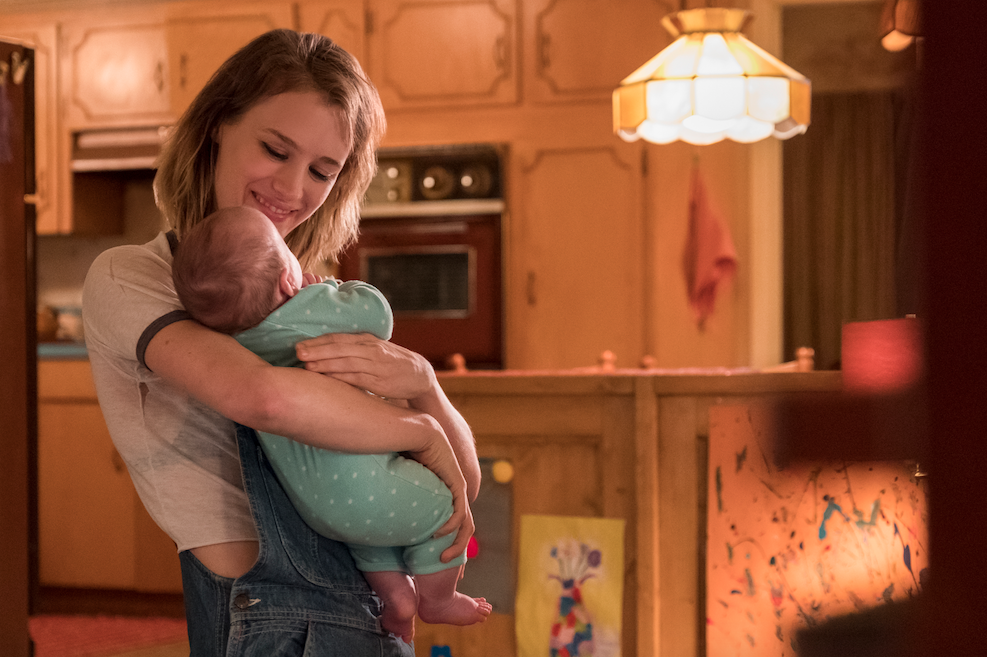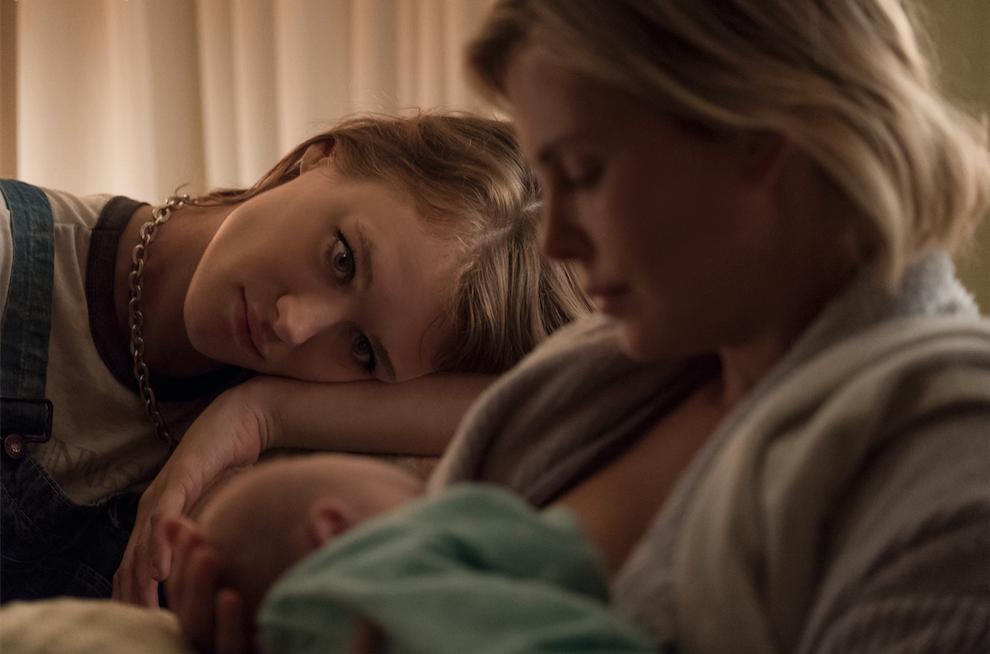It took Mackenzie Davis a long time to figure out how to play the role of a woman. Performing femininity might be something Tully — her eponymous character in the new collaboration between Diablo Cody and Jason Reitman — does with almost uncanny ease, but for Davis, it has often been a challenge. On screen and in real life.
“When you’re in your early 20s,” recalls the 31-year-old over the phone from LA, “you’re aware of the pressure and potential in your body. And I would see some people execute that potential like a ballet in front of me — this beautiful articulation of what I always thought a good woman would do, and I just couldn’t figure out how to wear my body in the same way. I felt like a failure. I just wanted to know what the secret was, and to have it look effortless in the way it looked effortless to other people.” These days, she says, she hasn’t exactly figured out the secret, “I just don’t really give a shit anymore.”
It’s one of the reasons she doesn’t think she could have played Tully — a 20-something night nanny who arrives, like Mary Poppins in a crop top, to ease the pressures of harassed mother Charlize Theron — when she was in her 20s. We see Tully’s breezy physicality, and the ease with which she inhabits her body, in sharp contrast to Theron’s Marlo, who moves through the world like someone trapped in their own skin. And in their own life too. Critics have certainly fixated on the characters’ physical differences — — Theron gained weight for the role, while Davis is “a perky, sprite-ish younger woman,” ( Empire), “sharp and sexy in a maroon cut-off top”, (Variety), “sexy, weird and slightly wild” ( The Washington Post) [all of these quotes, for what it’s worth, are from male critics] — but Davis’s character is not simply an object of bodily jealousy for Marlo. Diablo Cody, who also wrote Juno and Young Adult, is too sharp a writer for that — and besides, Davis wouldn’t have been interested if that was all there was to it.
“I was interested in this really lovely, platonic friendship between them,” she explains. As Tully makes herself essential to Marlo’s life, an intimate symbiosis develops between them, each representing something the other is striving towards — for Marlo, freedom, for Tully, stability. “Your life is boring,” Tully tells Marlo with a tone of wonder, “That’s the goal!” Does Davis agree? “Kind of. There were definitely times in my 20s when all I wanted was to know that I would find someone to be with and feel stable someday. But I have a lot of stability right now, and I look back and feel a longing to be a different, younger version of myself, and to be wilder and more reckless.”
Still, she’s glad she no longer has to live up, or fail to live up, to the mythology of youth. “I always felt like I should have this really explosive, crazy, wild life. My 20s were sometimes crazy, but often just anxious and boring. I couldn’t wait to turn 30 so all of that pressure could be turned off,” she laughs, “and I could live how I wanted to live, and it wouldn’t feel like I was somehow failing to be this iconic 20-something. I think Tully is about giving yourself permission, or having someone else give you permission, for the pace you’re living your life.”
“I think Tully is about giving yourself permission, or having someone else give you permission, for the pace you’re living your life” — Mackenzie Davis
But there’s more to Tully than that — and not just in the form of a twist that Davis is anxious to keep under wraps. At times, I suggest, the chemistry between the two feels almost romantic. She agrees, but doesn’t feel that’s particularly unusual. “In a really intense, loving female friendship, there is support and attraction and resentment and a little bit of sexuality. They’re just these really nuanced, intense relationships, and I felt like Diablo captured that really well.”
Davis tends to be drawn to this kind of project: one with a complicated female relationship at its centre. After landing supporting roles alongside Daniel Radcliffe in The F Word, and alongside Zac Efron in That Awkward Moment, it was a starring role as the brilliant, obstinate computer coder Cameron Howe in TV drama Halt And Catch Fire that put Davis on the map.
As the series progressed, it propelled its female characters so much to the fore that by the time show ended in 2017, the fractious, complex relationship between Cameron and her sometime business partner Donna was its beating heart. Then came indie psychological thriller Always Shine, a two-hander between Davis and Caitlin FitzGerald, followed by a role as an introverted gay woman in the Black Mirror episode San Junipero. Thanks to its upheaval of a troubling pattern Davis hadn’t even known about beforehand, that episode gained a cult following.
“I certainly wasn’t aware of the Bury Your Gays trope at all,” Davis admits, referring to TV and film’s tendency to kill off their queer characters, often shortly after they’ve acted upon their desires. “That’s such a cool part of making movies or TV. I was a small part in someone’s brilliant idea, I didn’t understand the social implications of this happy ending story, and then the audience told us. It was such a reaffirming experience, about how important it is to have that conversation in art, and not isolate ourselves when we make something. It was one of those things where you’re like, ‘Alright, if I’m gonna enjoy all this good feedback, then when I get bad feedback, I’ll have to engage with it just as openly. Otherwise this whole process is a bit blind and masturbatory.’”
True to her word, when Davis discovered her character in The Martian, Ridley Scott’s 2015 sci-fi film starring Matt Damon, was intended to be of Asian origin, she didn’t shy away from her own unintentional complicity in the controversy. “With the whitewashing conversation, the world has changed so much in the past five or six years, and it’s so fucking cool,” she says now. “But it’s a process, and it’s really important to engage with it, and to allow yourself to be educated by it, and to not be defensive when you’re being educated. But also, as the people giving the critique, to have that be a part of the process — that it’s not banishment, but that we’re educating people.”

That’s what she hopes will come of the recent revelations that have lit a fire under Hollywood’s abuse and mistreatment of women — that they lead to education and, crucially, actual change. “The good thing about Me Too and Time’s Up is that a lot of structural, brick and mortar solutions arose at a really fast pace out of these conversations. Even in my adulthood, the conversation around feminism has felt so cyclical. It reaches a peak, and then everyone gets sick of it, and then it comes up again and it reaches a peak, and people get sick of it. But it feels like Me Too and Time’s Up and a lot of attendant conversations about intersectional feminism, have had more staying power, and people have wanted to not just talk anymore. At least right now. I mean, I’m tired of talking about it! Not in this interview, but there comes a point where you’re like, ‘Alright, are we gonna talk forever or is there gonna be some active social change?’ And this time it does feel like active social change.”
“It’s been exhausting,” she lets out a sharp exhale, something between a laugh and a sigh. “But also exhilarating. To be like, ‘Oh weird, our voices matter!’ For the first time in a long time.”
Tully is in cinemas nationwide 4 May.
